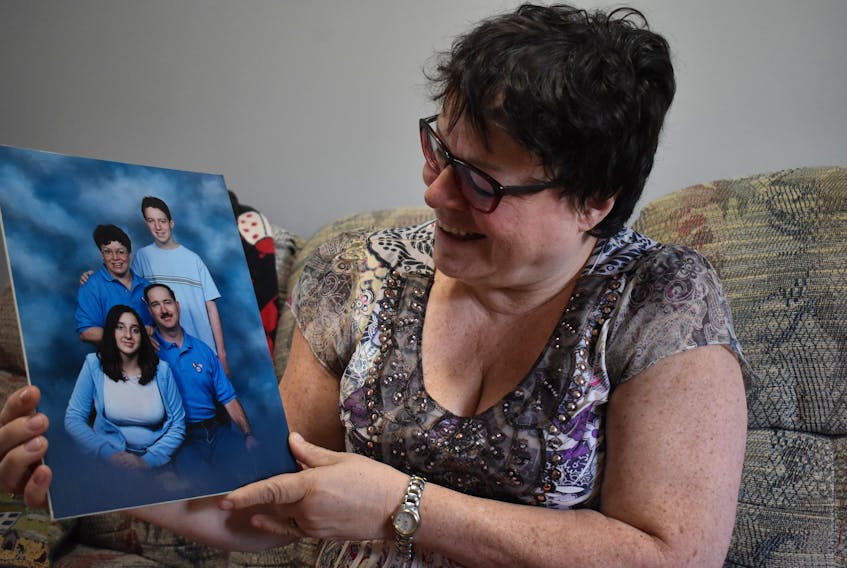MIDDLETON, N.S. — Trish Gallant’s memories of her ailing mother are more powerful than nagging urges to numb her pain with narcotics.
“They had to keep her, bluntly put, drugged while she was on her last leg,” said Gallant in a recent interview from her Kingston home.
Her mother had long turned to the prescription painkiller Percocet for relief until she died of cancer in July 2013.
“I saw what it did to her as she was taking her last breath and what have you,” the 57-year-old said.
Gallant was in the midst of her own battle with prescribed painkillers at the time.
She’s undergone 13 knee surgeries, including four replacements.

“I had been on Dilaudid for 12 years and I could not get off the last part,” she said.
She vowed to get help managing the pain and withdrawal symptoms at the heart of her own opioid dependency.
“I made the decision right there when my mom passed that the last gift that she gave me was to be clean.”
She checked in to a three-week, inpatient withdrawal management program at Soldiers Memorial Hospital in Middleton Aug. 27, 2013.
‘INNOCENT ADDICT’
“I wasn’t doing anything illegal. I wasn’t killing, raping, pillaging or robbing to try to get these pills. I was taking what was prescribed for me, so they labelled that in the rehab as an innocent addict,” Gallant recalled.
She remembers feeling as though a switch flicked when someone described her as innocent.
“When they labelled that for me, it didn’t make me feel like a bad person,” she said.
Counsellors with the program offered a new perspective on traumatic moments that served as constant sources of guilt and shame throughout Gallant’s life.
She found professional support that addressed underlying issues associated with instances of childhood sexual abuse that she endured at ages five and ten.
She went into the program thinking her dependency on prescription drugs linked her to one of her abusers, who assaulted her while he was high.
“I associated the two things together with that and I never even faced this molestation until I did that rehab,” she said.
“They helped me with the trauma and differentiating between the two and, to that, I owe them, blatantly put, my life - because I wouldn’t talk about it, because I never did talk about it. I never did tell my parents.”
She knew she had more than her fair share of heart-wrenching experiences going into to the inpatient program.
Gallant, originally a Spencer coming from a family of 14, recalls the evening her childhood home in Bloomington, Annapolis County burned to the ground with their pets inside. She was 10 at the time.
“Only thing we had was the nighties on our back,” she said. “It was 5:30 in the morning.”
Counselling helped her see how bits and pieces of everything she pushed through compounded and contributed to her opioid dependency.
“I liked not being in pain. That’s probably the main thing and then, as time went on, it kind of helped me not give a shit,” she confided.
But there is some pain the pills could never touch.
TRAGEDY STRIKES
Twelve years ago, on Halloween Day, her 22-year-old son died in a car accident along Highway 1 in East Kingston.
“How ironic was it that he died on his favourite day of the year, that you can go and beg for food and not be arrested,” she said, smiling at the recollection of her son’s love of the spooky holiday.
“I had just given him the car the week before, so I lived with that guilt for five years.”
Her blue-eyed boy, Daniel, stood at six-foot-six, wore a size-16 shoe and had a shock of red hair that made him even easier to spot in a crowd.
“He was a phenomenal kid. He was too good to be true,” she said, beaming.
She’s thankful that her memories are no longer clouded by the “foggy brain” she experienced prior to completing the inpatient withdrawal management program.
“I didn’t think it was fogging my memory or anything until about six weeks after I had been off of them,” she said.
“I can think clearly. I don’t have foggy brain.”
She links her successful rehabilitation to the structure provided in the local hospital, and the controlled setting.
“I wasn’t alone,” she said.
“If I didn’t do it that way, I might have given in because of the withdrawals, like the restless leg.”
She knew withdrawal would be difficult going in. In 2011, doctors temporarily took her off of her prescribed painkillers following a knee surgery that resulted in serious complications.
“The withdrawals had me screaming in the hospital – literally screaming,” she said, adding that the hospital staff eventually adjusted her doses to address the symptoms.
Gallant opted to go the “cold turkey” route while she was an inpatient – no methadone, no replacements.
She turned to long showers and Epsom salt baths for comfort throughout the most difficult withdrawal periods.
“The first week was hell but after that I could feel it,” she said.
LOCAL SERVICE CHANGES
Gallant was recently disappointed to learn that the inpatient withdrawal management program she credits with getting her life back on track is no longer in place at Soldiers.
“I just found out about that and I am so disappointed because it was the best – I’m going to say the best experience and the worst experience. The counsellors and everybody, and the services, was just unbelievable. And I’m so let down by the provincial government that it closed.”
Maureen Wheller, a senior communications advisor with Nova Scotia Health Authority’s Mental Health and Addictions division, said Soldiers Memorial Hospital offers a Day Wellness Program seven days a week, including on holidays, to connect clients with registered nurses, clinical therapists and counsellors.
“They provide education, support and counselling, both individually and in groups, to help others safely manage cravings and stabilize, build therapeutic relationships with clinicians who can help address their psychosocial needs to reduce risk of relapse and work toward connection to family and community,” said Wheller in an email.
The treatment plans for each client are decided as a result of clinical assessments.
“If the individual requires the level of care that includes an inpatient stay, they will be admitted to an inpatient bed in NSHA,” explained Wheller.
“With the evolution of evidence-informed practice, treatment of Opioid Use Disorder (OUD), in the majority of cases, is best provided while supporting the person in the community setting.”
The harm-reduction model favouring community-based supports stems from research that links complete abstinence to greater chances of relapse.
“This can be life threatening,” Wheller said.
“There is no need for hospitalization in the vast majority of people with OUD and it can put some at risk. An individual’s tolerance level before withdrawal can be significantly higher than after. If they use the same dose as before withdrawal, they may overdose and die.”
Various health professionals within the Annapolis Valley assist local Opioid Agonist Therapy programs offering people with OUD a replacement therapy option that uses methadone/ buprenorphine/naloxone to reduce cravings and increase an individual’s stability.
“Individuals can be completely impoverished, isolated, physically compromised and, with the appropriate care and support, rebuild their lives and become reconnected to their families and communities,” said Wheller.
“The earlier approach of admitting, withdrawing and abstinence did not often result in these positive outcomes.”
SAVING GRACES
As for Gallant, she’ll forever count the inpatient withdrawal management program she completed among her saving graces.
“It’s not easy, but it’s worth it,” she said.
“I never thought I’d beat it and here I am six years later.”
She regularly attends pain management seminars, and practices mindfulness and meditation as she strives to steer clear of opioids.
“It is a chore, especially when you’re hurting the way I do. It’s a chore to not want to go back,” said Gallant, briefly pausing before shaking her head.
“Not worth it.”
For the emotional hurt, she finds comfort – and joy – in the company of peers within a support group for mothers who have lost children. She regularly leans on her loving husband and daughter for support. She has great friends, and an unwavering faith in God.
And she feels she has a very special angel towering over as he did on land, with bright red hair and striking blue eyes.
“I’m better for getting off of it,” she said.
NEED HELP NOW?
Mental Health & Addictions,
Mental Health Crisis Line
1-888-429-8167 (toll-free)
Available 24 hours, seven days a week
Follow an in-depth series about opioids in Atlantic Canada throughout August here:









